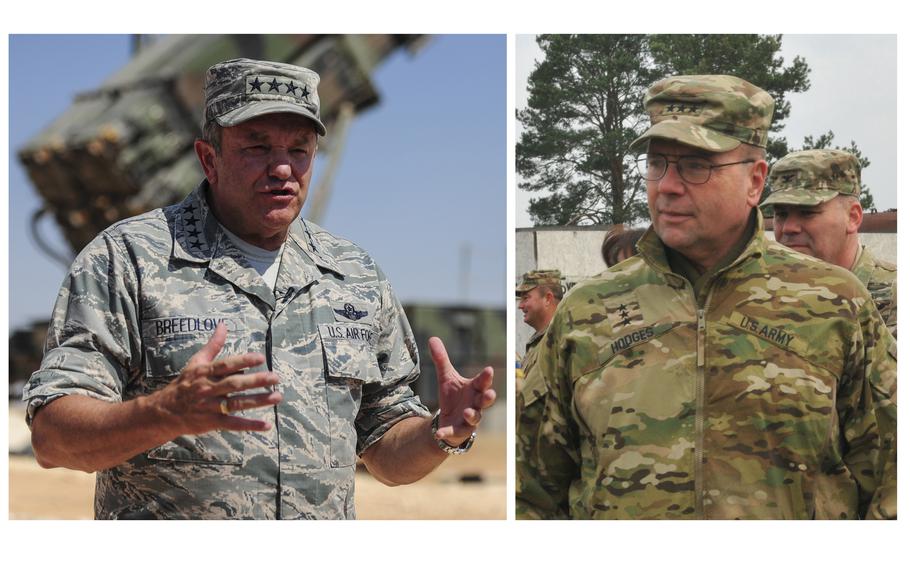
At left, Air Force Gen. Philip Breedlove, then-NATO’s Supreme Allied Commander Europe and commander of U.S. European Command, talks at a news conference July 31, 2014, in Gaziantep, Turkey. At right, Lt. Gen. Ben Hodges, then-commander of U.S. Army Europe, observes soldiers conducting training, Nov. 5, 2016, at the International Peacekeeping and Security Center in Yavoriv, Ukraine. (Nicole Sikorski/U.S. Air Force (left), Elizabeth Tarr/U.S. Army)
WASHINGTON — Two former generals are calling on Republican leaders in the House to put politics aside and quickly approve additional aid for Ukraine as the country’s forces press their counteroffensive against entrenched Russian troops.
Retired Air Force Gen. Philip Breedlove, a former NATO Supreme Allied Commander, and retired Lt. Gen. Ben Hodges, the former commanding general for U.S. Army forces in Europe, made the appeal in a letter this week to House Speaker Kevin McCarthy, R-Calif., who is attempting to build legislative consensus with a narrow Republican majority.
McCarthy is facing increasing pressure from hard-right Republicans to cut off Ukraine assistance and has indicated he will not include the White House’s recent request for $24 billion in additional aid in a spending bill that needs to pass by the end of the month to avoid a government shutdown.
“Now is not the time to allow partisan politics to get in the way of supporting an ally that is fighting for freedom, as well as their own existence,” wrote Breedlove and Hodges. “Ukrainians need our help. They need both military and non-lethal aid, and they needed it yesterday.”
The retired generals said Ukraine is at a critical juncture in the war and has the momentum to take back occupied territory despite a slower-than-expected counteroffensive. They defended the arming of Ukraine as vital to American strategic interests.
“Our economic prosperity at home is linked to Europe, and European prosperity depends on stability and security on the Continent,” Breedlove and Hodges wrote. “American prosperity also depends on the respect of sovereign borders, the freedom of navigation on the high seas and the credibility of international agreements. Russia has challenged each one of these pillars of American power.”
Their arguments are shared by most Republicans in the Democrat-led Senate, where Minority Leader Mitch McConnell, R-Ky., is regularly making speeches on the floor pushing back against Republican skeptics. McConnell said the Pentagon and other government agencies will brief Republican senators on oversight efforts for Ukraine aid, a frequent topic of conservative criticism.
Still, opposition to funneling more weapons and money to the war-torn country is growing from Republicans who contend the U.S. needs to focus on domestic priorities over foreign wars.
In July, 70 House Republicans voted for failed amendments to an annual defense policy bill that would strip all aid to Ukraine. The Heritage Foundation, a conservative think tank, joined other conservative groups Tuesday in calling on congressional leaders to reject continued support for Ukraine.
“Greenlighting the administration’s recent request for an additional $24 billion to fund the war does not serve the interests of the American people,” the groups wrote in a letter to Democrat and Republican leaders in the House and Senate.
Congress has signed off on $113 billion in military, economic, humanitarian, and other aid for Ukraine since last year. The latest request includes $13 billion in military assistance, including weapon shipments to the Ukrainian military and the replenishment of Pentagon weapon stocks.
Breedlove and Hodges said the money has been well spent so far.
“Having spent a fraction of the annual U.S. military budget in security assistance, Ukraine managed to cut Putin’s combat capacity in half,” they wrote. “That is a significant and historic return on investment when it comes to our own national security and interests, and the investment in protections against the threats posed by Putin and Russia against NATO members.”
The U.S. is the largest contributor to the Ukraine war effort, but it ranks 12th, behind the tiny countries of the Baltics and others, when accounting for the size of its aid relative to the size of its economy, according to the Council on Foreign Relations think tank.
The next package of U.S. aid to Ukraine is caught up in a spending battle on Capitol Hill that is pitting the House against the Senate as lawmakers race to negotiate a stopgap spending bill before the end of the fiscal year on Sept. 30. A government shutdown would go into effect Oct. 1 if an agreement is not reached.
Senate leaders are unlikely to approve legislation that does not include more assistance to Ukraine while McCarthy is reluctant to support measures that are unpopular with the hard-right House Republicans who helped propel him to his leadership post earlier this year.
House Republicans on Wednesday were forced to delay consideration of the Pentagon’s 2024 budget due to the widening discord among their ranks.